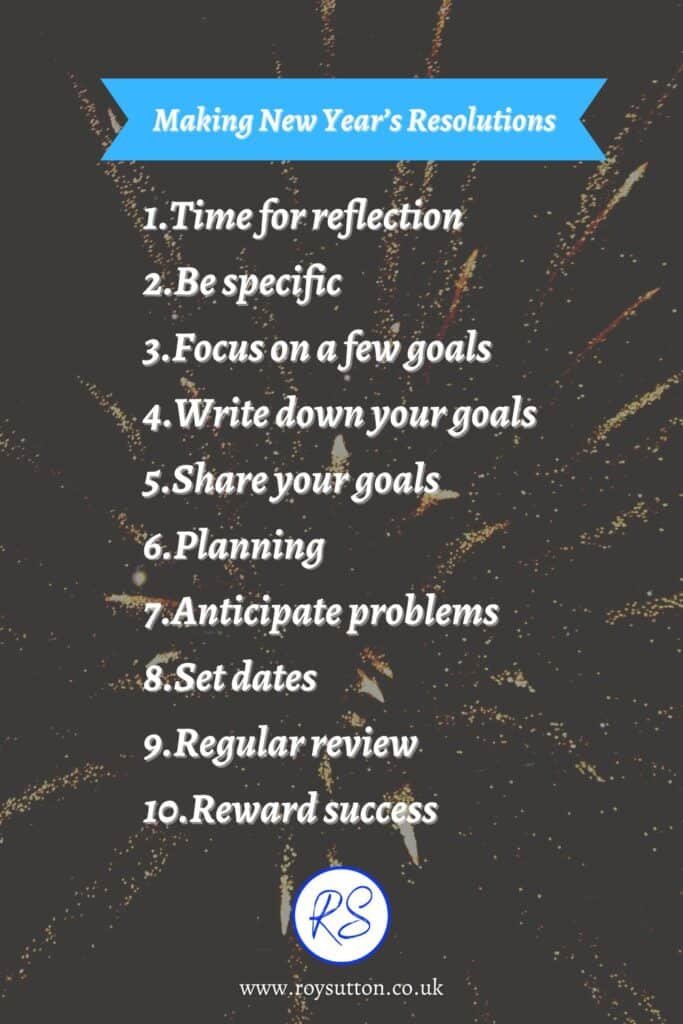
If you’re wondering about steps for making New Year’s resolutions, dear reader, this article is for you.
As a new year approaches, it’s natural to think about the year ahead and how it might be appropriate to make some resolutions to be improved versions of ourselves.
Perhaps we feel it’s time to reinvent ourselves. Maybe we recognise that we’d be better off if we could get rid of some bad habits or possibly develop a few good habits. Lose a little weight, perhaps? Then again, maybe we think it’s time to start our own business with the goal of becoming financially independent.
Whatever it is we have in mind, the new year is a new beginning, so we often see it as a vehicle for change. We think it will provide us with the motivation to make changes in our lives. However, rarely does it work out that way successfully. Certainly not for most people, in my experience.
All too frequently, we promise ourselves that we’ll do this or that, but as January progresses, we forget we’ve even made a New Year’s resolution. And that doesn’t really help us at all, does it?
So, if you’re thinking about making some New Year’s resolutions, dear reader, make sure you don’t set yourself up for failure.
Successful change is achieved in small steps, not giant leaps.
If you’re going to make some resolutions, make sure they’re achievable. Make resolutions that are hard to keep, and they won’t be kept. Simple!
Here are 10 steps for making New Year’s resolutions you can successfully stick to for the long term:

Steps for making New Year’s resolutions:
1. Time for reflection:
The first step is to spend some time thinking about where you are in life and where you’d like to be.
What have you accomplished so far, and what would you like to accomplish in the future?
Where have you struggled, and why? Perhaps your skillset needs improving, or maybe you have some really bad habits that you should eliminate.
Spending some time on reflection should help you identify areas of your life that you want to focus on improving in the new year.
However, let me stress once again, think in terms of small steps rather than giant leaps.
2. Be specific:
If goals are to be achievable, then they need to be specific.
Rather than say, I want to lose weight. It’s much better to say, My goal is to lose 16 pounds by the 1st of March.
With that goal, you’ll know you must lose two pounds every week if you’re to achieve your target.
Then you can start focusing on related issues like diet, calorie count, exercise and so on.
3. Focus on a few goals:
You’re not going to achieve 20 goals in the new year. Most of them will get lost very quickly.
Decide on one, two, or possibly three things you’d like to achieve, and then prioritise them.
4. Write down your goals:
You’ll have a much greater chance of success if you commit your goals to paper.
Psychologically, it will have an impact on you if you write them down. It will seem like a true commitment, and it will drive your unconscious mind to think about what needs to be done.
5. Share your goals with someone:
Sharing your goals with a friend will again reinforce your psychological commitment to those goals.
This will help you stay motivated, and it means that you make yourself accountable as you’re working towards achieving your goals.
Let’s face it, no one wants friends or family members to know that we failed. So, if they know you’re committed to a goal, you’ll have no choice but to make sure that you achieve it.
6. Planning:
For each of your goals, you must plan accordingly.
Break each goal down into its constituent parts and come up with a plan as to how you will achieve them.
Really, this just means breaking your goals down into smaller, actionable steps and then creating a timeline for completing each step.
7. Anticipate problems:
Reaching goals is never easy. There will always be problems along the way. That’s just life.
So, make a list of the potential problems that might occur at certain times of the day, in given situations, or with certain people as you work towards achieving your goals.
Once you’ve identified the potential problems, you can then work out ways that will help you deal with them as and when they occur. In short, be prepared.
8. Set dates:
This is all about being specific again, and it fits into the planning process.
When will you get started?
When will you achieve your goal? By what date, specifically?
Be realistic, but challenge yourself too.
9. Regular review:
Right, you’ve set goals, you’ve got a plan in place, and you’ve set dates for starting and completion.
The next step is to set regular intervals to review progress.
This might be weekly, monthly, and/or quarterly. Whatever seems appropriate, depending on the goal.
As you review progress, you’ll be able to identify whether small adjustments need to be made to your plan to achieve your goal on time.
Obviously, you’ll need to be flexible and willing to adjust your goals and plan as required.
10. Reward success:
To achieve your goal, you’ll need to be very disciplined, of course, but it also helps if there’s a potential reward at the end of the process.
So, promise yourself a suitable reward if you achieve your goal.
Success deserves to be rewarded.

Concluding remarks:
We’ve all made resolutions over the years that have come to nothing.
It’s easy to say what we plan to do, but it’s much harder to do it and achieve our end goal.
However, just because you’ve failed with resolutions in the past doesn’t mean you’re doomed to fail in the future.
Set your resolutions carefully, approach them methodically, and don’t give up until you get to where you want to be.
It can be done, and people do. So can you!
Now that you know how to make a New Year’s resolution, you’re one step closer to achieving your goal.
Remember, small steps and not giant leaps.
Good luck!

Please share this post with your friends:
If you found this article useful, then please share it on social media with your friends.
When you share, everyone wins.
Please share it now, and I’ll be ever so grateful.
You’ll be helping a keen blogger reach a wider audience.
Thank you for your support, dear reader.

Other articles you might also find interesting:
- How the power of words can change lives
- Public Speaking: The Power of the Pause
- Productivity Tips: How to Structure Your Day
- George Carlin’s Top 10 Rules For Success
- 4 cornerstones for how to speak so people will listen
- A Motivational A – Z Guide to Success
- Have the courage to step out of your comfort zone
- 3 of life’s lessons learned that you really should know
- Valuing people must take precedence in the modern age
- Top wealth creation strategies for financial success
- Why an investment in knowledge pays dividends
- 13 tips for improving your personal happiness
- Steve Jobs’ Top 10 Rules For Success to inspire you
- 25 inspirational stories of people going from rags to riches
- How to find the right job for you: Simply Explained
- How to spot a liar and be your own lie detector
- Self-promotion and why it matters if you want success
- 21 things you need to know in life to avoid its pitfalls
- 9 tips for getting the most from your work
© Mann Island Media Limited 2025. All rights reserved.








